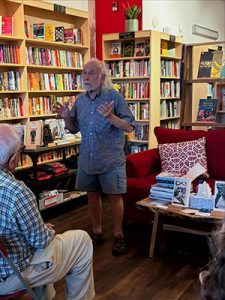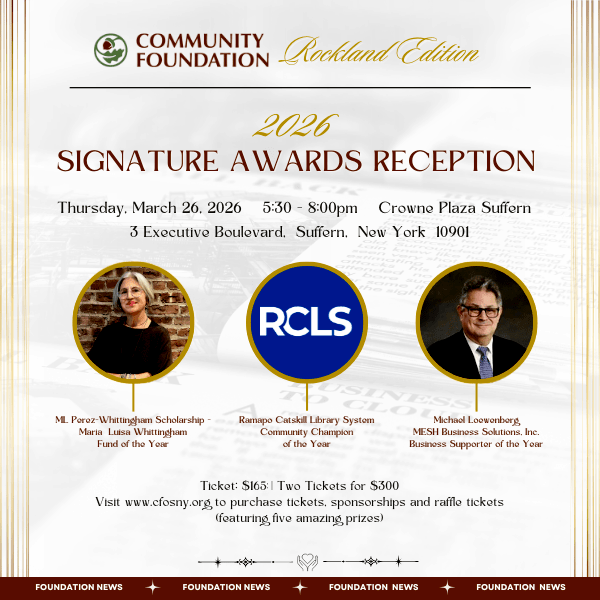|
RCBJ-Audible (Listen For Free)
|
Editor’s Note: The arts are a significant thread in the fabric of Rockland County. They inspire, enrich, and chronicle our lives. They also play a role in our economic well-being; theater, writing, dance, crafts draw us to spaces. They invite strangers to share in our bounty. They are an indelible contribution. Welcome again, Christine Potter, a poet, to RCBJ.
Wally Glickman: Who Are You Calling A Formalist?
 Sometimes I get to read with a very kind group of New York City writers of metrical, rhymed verse. I usually open my spot on their open mics by saying “I’m not a formalist, but I play one on TV.” Everyone laughs at the lie: I don’t play anything on TV. And sometimes, I do write sonnets and villanelles instead of my usual free verse. Sometimes, that is—not often. I’m most comfortable making up my own form as I go.
Sometimes I get to read with a very kind group of New York City writers of metrical, rhymed verse. I usually open my spot on their open mics by saying “I’m not a formalist, but I play one on TV.” Everyone laughs at the lie: I don’t play anything on TV. And sometimes, I do write sonnets and villanelles instead of my usual free verse. Sometimes, that is—not often. I’m most comfortable making up my own form as I go.
So when I first read poems by Pomona’s Wally Glickman, I figured, “Aha! This guy’s a formalist!” And that, boys and girls, is why going to poetry readings is so important. Yes, Glickman plays with the old forms—he has a wonderful ode to a bagel with a nice little four-line envoi at the end—but I wouldn’t call him a formalist poet.
That bagel ode…well, you truly must see Glickman perform it, baked good in hand. Wally’s website calls him a “word worker” which is the right term for what he does. With a deep background in teaching and theater (and physics!) he lives in the place slam and Shakespeare crash into each other and then bend over double laughing.
Last week, at Big Red Books in Nyack, I watched Wally Glickman hold an SRO crowd rapt, despite heat, jungle-like humidity, a sudden rainstorm, and a fire truck screaming past. Wally’s an astonishing reader. His poems are musical (he writes songs, too), funny, political, and somehow also reverent. Here’s one that I am pretty darn jealous of:
MAP-LESS MONARCHS
Map-less monarchs make it to Michoacan,
The sparrow spurts to a limb and alights,
The whale wakes the water and so does the swan,
The falcon soars to astonishing heights,
And the Milky Way spins, be it ever so slowly,
As we carve out turf in the One-Turning,
This cosmos, so stunningly endlessly holy,
We shatter to shards, and stifle our yearning.
This world, we have conjured, bereft of Being,
Sand in a void, of all Spirit bled,
Each speck a separate celibate thing,
A meaningless mote, essentially dead…
Yet the river remembers to flow and stay wet,
And the albatross folds her wings just right,
And the sun seems to know just where it should set,
And the clouds seem to know what to do with the light.
![]()
I love the alliteration in the title and first line of the poem; all the “m” sounds make it delicious. He uses the same trick in “the whale wakes the water,” the first stanza’s third line—and it’s a lovely and meaningful image. Plus, the third line in the next stanza, “This cosmos, so stunningly endlessly holy,” shows why this poem needed to be metrical and not free verse. That line becomes a dance when you read it aloud.
But here’s what’s the most enviable—this is a poem about how we shut out God: “This world, we have conjured, bereft of Being…” It’s almost a hymn. And God’s expression is in the natural world. Look at those last two lines! It’s simply gorgeous. Dang.
Wally tells me that he admires ee cummings, early Wordsworth, Whitman, Phillip Larkin, Emily Dickinson, Bob Dylan, and Keats, because of the magic they infuse into their words. He appears to have learned quite a bit of that magic himself.
Glickman’s earliest poem, he says, was about the World Series the Brooklyn Dodgers won, beating the Yankees (yay). He offers a couplet: “… two of them scored, the crowd, how they roared…” The word worker was all of eight years old then. So let’s say he’s had some practice with topical verse. Unfortunately, today’s news is not nearly as much fun! Here’s a more recent effort:
HOPING I’M WRONG…
It’s a done deal let’s not pretend:
This nation’s fascist bound
The pieces are all in place my friend
You can feel it all around
Folks with pens and furrowed brows
And tongues on their upper lips
Are adding numbers, making vows
While the rats have left the ships
Foreign folks are in the streets
While we’re still watching Jaws
And the knaves up in the penthouse suites
Don’t need to hide their guffaws
We’re still trying hard to please
While the Dukes are a step ahead
We’re dotting i’s and crossing t’s
But it seems we’ve lost the thread
They’ve taken our subpoenas
And torn them into shreds
Tossed them to the hyenas
And peed on all our beds.
All the Earls and all the Dukes
Smile as they take turns
Raking shekels, stashing nukes
While the planet burns
Now they’re rolling in the clover
Now they’re zipping up their flys
While we’re still bending over
With blindfolds on our eyes
So hold my hand my darling
As we shuffle through the charade
Strange fruits fall like confetti
On this vacuous parade
![]()
This one gets angrier and angrier as it goes along. Dukes, earls, and knaves—yeah, that’s about right. And nukes! It’s a dark poem, but darkly funny in places, and it ends with a stanza that calls out to a partner: “So hold my hand my darling.” Glickman loves love, which is clear in everything I’ve read and heard by him. “Strange fruits” (nice allusion to the equally dark Billy Holiday masterpiece) may “fall like confetti,” but even though things seem nearly hopeless, there’s always a reason to go on. How many poems about our current woes have the word “confetti” in them?
He gives us more specific reason to hope here:
HARMONY
Your fingers, when you tie your shoe,
Seem to know just what to do
Without your help. They don’t compete,
They don’t conspire, and they don’t cheat.
Driven by a higher power,
Like the petals of a flower,
They do their task in harmony.
And so could we. And so could we.
![]()
Again, love—and harmony—wins, “driven by a higher power.” And it’s an instinctive one: fingers tying a bow don’t compete with one another. Harmony is the absence of competition and betrayal. And as Glickman says—twice!—“and so could we.” We could, we could!
If you can’t get to a Wally Glickman reading, his website is rich with songs and poems, and is also a fine place to purchase any or all of his five chapbooks. His songs are there, too; you can have a listen to “Latkes in my Gatkes,” which I recommend that you do promptly, even if it’s not Chanukah. It’s all here: www.wallyglickman.com.
I’ll leave you with a piece of rhymed, metrical verse I attempted a few years back when my husband got into the habit of eating gas station hot dogs on his way to go practice pipe organ at his old job. Yeah, he’s a church musician. And my poem is a villanelle. But I’m no formalist. I just play one on TV.
To My Husband, In Hopes He Will Consume No More Gas Station Hot Dogs
Don’t eat the hot dogs from that vile machine
that rolls them ceaselessly all night, all day.
You’re smart enough to know that thing’s not clean—
a blot on sanitation and cuisine—
and yet you do not listen when I say,
“Don’t eat the hot dogs from that vile machine.”
Instead, you’re fascinated by their sheen,
their wafting porky scent—that whole display.
(But smart enough to know that thing’s not clean.)
You drive and dribble mustard on your jeans
and fail to throw the nasty plate away.
Don’t eat the hot dogs from that vile machine.
Six hours hence, you’ll certainly turn green
if not the hue of old papier-mâché.
You’re smart enough to know the thing’s unclean.
My husband dear, they’re tubular, saline
and only lead to sad bathroom ballet.
Don’t eat the hot dogs from that vile machine.
You’re smart enough to know that thing’s not clean.
See you in August! Don’t forget to some include a few poetry books in your beach bag along with the big, fat novel you’ve been wanting to read! And a special shout-out to Richard Fulco and Big Red Books in Nyack. The Wednesday poetry evenings are on break until the fall, but Big Red can supply your literary needs in any season.
Photo credit: Wally Glickman reading at Big Red Books. Photo by Richard Fulco















